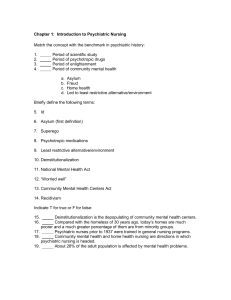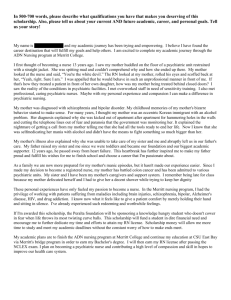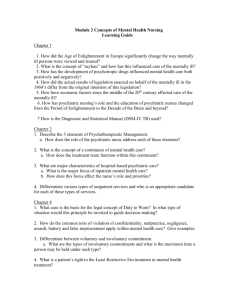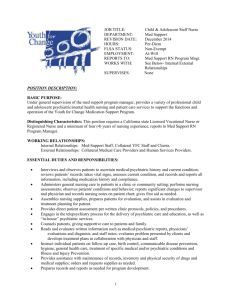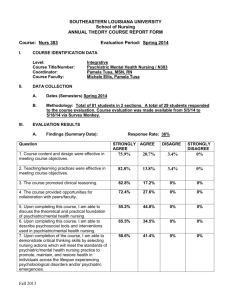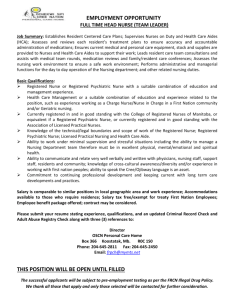Sample of Test Bank for Principles and Practice
advertisement
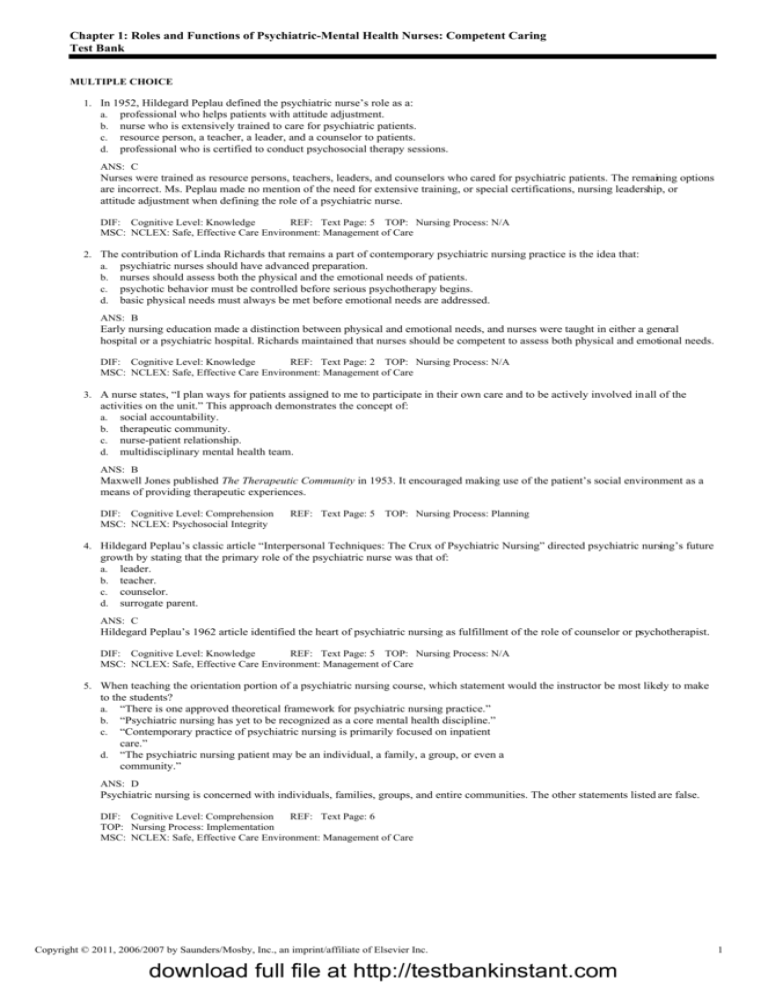
Chapter 1: Roles and Functions of Psychiatric-Mental Health Nurses: Competent Caring Test Bank MULTIPLE CHOICE 1. In 1952, Hildegard Peplau defined the psychiatric nurse’s role as a: a. professional who helps patients with attitude adjustment. b. nurse who is extensively trained to care for psychiatric patients. c. resource person, a teacher, a leader, and a counselor to patients. d. professional who is certified to conduct psychosocial therapy sessions. ANS: C Nurses were trained as resource persons, teachers, leaders, and counselors who cared for psychiatric patients. The remaining options are incorrect. Ms. Peplau made no mention of the need for extensive training, or special certifications, nursing leadership, or attitude adjustment when defining the role of a psychiatric nurse. DIF: Cognitive Level: Knowledge REF: Text Page: 5 TOP: Nursing Process: N/A MSC: NCLEX: Safe, Effective Care Environment: Management of Care 2. The contribution of Linda Richards that remains a part of contemporary psychiatric nursing practice is the idea that: a. psychiatric nurses should have advanced preparation. b. nurses should assess both the physical and the emotional needs of patients. c. psychotic behavior must be controlled before serious psychotherapy begins. d. basic physical needs must always be met before emotional needs are addressed. ANS: B Early nursing education made a distinction between physical and emotional needs, and nurses were taught in either a general hospital or a psychiatric hospital. Richards maintained that nurses should be competent to assess both physical and emotional needs. DIF: Cognitive Level: Knowledge REF: Text Page: 2 TOP: Nursing Process: N/A MSC: NCLEX: Safe, Effective Care Environment: Management of Care 3. A nurse states, “I plan ways for patients assigned to me to participate in their own care and to be actively involved in all of the activities on the unit.” This approach demonstrates the concept of: a. social accountability. b. therapeutic community. c. nurse-patient relationship. d. multidisciplinary mental health team. ANS: B Maxwell Jones published The Therapeutic Community in 1953. It encouraged making use of the patient’s social environment as a means of providing therapeutic experiences. DIF: Cognitive Level: Comprehension MSC: NCLEX: Psychosocial Integrity REF: Text Page: 5 TOP: Nursing Process: Planning 4. Hildegard Peplau’s classic article “Interpersonal Techniques: The Crux of Psychiatric Nursing” directed psychiatric nursing’s future growth by stating that the primary role of the psychiatric nurse was that of: a. leader. b. teacher. c. counselor. d. surrogate parent. ANS: C Hildegard Peplau’s 1962 article identified the heart of psychiatric nursing as fulfillment of the role of counselor or psychotherapist. DIF: Cognitive Level: Knowledge REF: Text Page: 5 TOP: Nursing Process: N/A MSC: NCLEX: Safe, Effective Care Environment: Management of Care 5. When teaching the orientation portion of a psychiatric nursing course, which statement would the instructor be most likely to make to the students? a. “There is one approved theoretical framework for psychiatric nursing practice.” b. “Psychiatric nursing has yet to be recognized as a core mental health discipline.” c. “Contemporary practice of psychiatric nursing is primarily focused on inpatient care.” d. “The psychiatric nursing patient may be an individual, a family, a group, or even a community.” ANS: D Psychiatric nursing is concerned with individuals, families, groups, and entire communities. The other statements listed are false. DIF: Cognitive Level: Comprehension REF: Text Page: 6 TOP: Nursing Process: Implementation MSC: NCLEX: Safe, Effective Care Environment: Management of Care Copyright © 2011, 2006/2007 by Saunders/Mosby, Inc., an imprint/affiliate of Elsevier Inc. download full file at http://testbankinstant.com 1 6. For psychiatric nurses in the 1980s and 1990s, the scope of practice began to change to include: a. psychiatric care and medical care given by the home care nurse. b. new advances in the fields of psychobiology and technology. c. psychoanalytical therapy provided by the psychiatric nurse in the outpatient d. setting. new advances in the psychodynamic model of therapy made by the psychiatric nurse in the inpatient setting. ANS: B Psychobiology and technology experienced dramatic growth in the 1980s and 1990s including advanced understanding of brain function, understanding the relationships of the brain, behavior, emotion, cognition, neurotransmitters and neuronal receptors, as well as improved brain imaging. The options related to home care and outpatient care settings are not true. The option related to the psychodynamic model of therapy is also incorrect because advances in the psychodynamic model of psychiatric care were made by psychiatrists and psychologists, not by psychiatric nurses. DIF: Cognitive Level: Comprehension TOP: Nursing Process: Implementation REF: Text Page: 6 MSC: NCLEX: Psychosocial Integrity 7. During orientation to the inpatient psychiatric unit, new staff members are told, “Address all patients by their title and surname unless you are directed by the patient to do otherwise.” The belief that underlies this directive is that: a. every person is worthy of respect. b. every individual has the potential to change. c. the goals of the individual are growth, health, autonomy, and self-actualization. d. the person functions as a holistic being who reacts to the environment as a whole person. ANS: A Addressing an individual using his or her title and surname implies dignity and worth and conveys respect. DIF: Cognitive Level: Comprehension TOP: Nursing Process: Implementation REF: Text Page: 7 MSC: NCLEX: Psychosocial Integrity 8. A psychiatric aide says, “I don't know why that patient does all that silly giggling and posturing. It’s senseless!” Thebest reply to this comment would address the psychiatric nursing principle that states: a. every individual has the potential to change. b. illness can be a growth-producing experience for the individual. c. all behavior is meaningful, arising from personal needs and goals. d. everyone has the right to self-determination that includes the pursuit of health. ANS: C This principle best addresses the aide’s comment that the patient’s behavior is “senseless” by explaining that all behavior has meaning that can be understood when the patient’s internal frame of reference and the context of the situation are known. DIF: Cognitive Level: Application TOP: Nursing Process: Implementation REF: Text Page: 7 MSC: NCLEX: Psychosocial Integrity 9. The role of the psychiatric nurse in today’s contemporary practice settings is: a. centered on the nurse-patient partnership. b. concentrated on psychosomatic therapies. c. centered on management of the patient’s daily needs. d. caring for chronically ill psychiatric patients in acute-care settings. ANS: A The role of the psychiatric nurse today is multifocused. The psychiatric nurse must have a broader perspective on patient needs, psychiatric needs, personal needs, financial needs, and legal needs that encompass the patient’s quality of life. DIF: Cognitive Level: Comprehension REF: Text Page: 6 TOP: Nursing Process: N/A MSC: NCLEX: Safe, Effective Care Environment: Management of Care 10. The primary opportunity provided by psychiatric clinical rotations for nursing students is an opportunity to: a. become familiar with patients who have chronic psychiatric mental health issues. b. work with patients who have psychiatric as well as physical health issues. c. learn to work with patients with various psychiatric mental health issues. d. learn to care for patients who have emotional disorders. ANS: C Students who have the opportunity to work in a psychiatric-mental health setting benefit because of the opportunities to work directly with a specific population of patients with psychiatric-mental health illnesses. In acute care, medical-surgical units, general outpatient clinical settings, or long-term care settings, students can only care for the patients served in the setting and hope that they will acquire some knowledge about the psychiatric disorder process and how it affects patients. Unfortunately, in these settings, the chances for learning about advances in the field of psychiatry or behavioral health would not be available. DIF: Cognitive Level: Comprehension MSC: NCLEX: Psychosocial Integrity REF: Text Page: 6 TOP: Nursing Process: N/A Copyright © 2011, 2006/2007 by Saunders/Mosby, Inc., an imprint/affiliate of Elsevier Inc. download full file at http://testbankinstant.com 2 11. Case supervision is a psychiatric nursing activity that falls within the nursing practice domain of: a. community education. b. communication. c. management. d. direct care. ANS: D Management is a direct care activity. Figure 1-3 depicts this graphically. DIF: Cognitive Level: Knowledge REF: Text Page: 7 TOP: Nursing Process: N/A MSC: NCLEX: Safe, Effective Care Environment: Management of Care 12. When one considers the roles and functions of psychiatric nursing, the overlap of communication and management roles is seen in the function of: a. teaching. b. delegation. c. direct care. d. collaboration. ANS: D Collaboration is defined as the shared planning, decision making, problem solving, goal setting, and assumption of responsibilities by people who work together cooperatively and with open communication. Figure 1-3 depicts this graphically. DIF: Cognitive Level: Comprehension REF: Text Page: 7 TOP: Nursing Process: N/A MSC: NCLEX: Safe, Effective Care Environment: Management of Care 13. The major determinants of the roles in which a psychiatric nurse engages are: a. personal preference and age. b. local custom and physician support. c. state law and personal qualifications. d. work setting and personal preference. ANS: C While the other options may be contributors to role identification, state law is the primary determinant of the roles nurses may assume in any state. DIF: Cognitive Level: Comprehension REF: Text Page: 9 TOP: Nursing Process: N/A MSC: NCLEX: Safe, Effective Care Environment: Management of Care 14. Nursing should increase its role in the advocating of funding for outcome studies because these studies: a. increase patient compliance with therapeutic regimens. b. document quality, cost, and effectiveness of psychiatric nursing. c. update psychiatric nursing specialists on new practice developments. d. lead to the implementation of untried interventions and practice guidelines. ANS: B It is important to prove that psychiatric nursing contributes to positive outcomes in the prevention of illness, the promotion of health, and the provision of cost-effective treatment of psychiatric disorders. Without such information, the specialty of psychiatric nursing may be discounted by users and others. DIF: Cognitive Level: Comprehension REF: Text Page: 10 TOP: Nursing Process: Planning MSC: NCLEX: Safe, Effective Care Environment: Management of Care 15. New opportunities for psychiatric nursing practice have emerged as psychiatric hospitals have changed from large institutions providing custodial care to: a. small units providing acute inpatient care. b. integrated clinical systems providing a full continuum of care. c. community-based home care systems focused on the chronically mentally ill. d. agencies more concerned with mental health promotion than providing direct care. ANS: B Alternative treatment settings have emerged throughout the continuum of mental health care, and hospitals have responded by creating integrated clinical systems that provide inpatient care, partial hospitalization, day treatment, residential care, home care, and ambulatory care as part of the parent organization. Psychiatric nurses provide care in each of these settings as well as in community-based treatment settings such as shelters, schools, and HMOs. DIF: Cognitive Level: Comprehension REF: Text Page: 9 TOP: Nursing Process: Planning MSC: NCLEX: Safe, Effective Care Environment: Management of Care Copyright © 2011, 2006/2007 by Saunders/Mosby, Inc., an imprint/affiliate of Elsevier Inc. download full file at http://testbankinstant.com 3 16. A psychiatric nurse uses leadership skills to strengthen the profession by: a. working as a change agent advocating for patients, families, and communities. b. volunteering time each week to outpatient clinics in poor neighborhoods. c. voting for candidates in local elections who will advocate for nurses. d. working for state government representatives at local voting sites. ANS: A Psychiatric nurse leaders need to be change agents who work not only in the profession but also with other interdisciplinary colleagues to advance the care of patients with psychiatric disorders. DIF: Cognitive Level: Comprehension REF: Text Page: 10 TOP: Nursing Process: Implementation MSC: NCLEX: Safe, Effective Care Environment: Management of Care 17. In the 1960s, the psychiatric nurse began to shift to primary prevention and psychiatric nursing practice began to focus more on community care. This focus was initiated by which act? a. The Primary Prevention Act of 1960 b. The Deinstitutionalization Act of 1961 c. The Therapeutic Community Act of 1962 d. The Community Mental Health Centers Act of 1963 ANS: D The only act that is genuine is the Community Mental Health Centers Act of 1963. DIF: Cognitive Level: Comprehension REF: Text Page: 5 TOP: Nursing Process: N/A MSC: NCLEX: Safe, Effective Care Environment: Management of Care 18. A nurse is contemplating a change from a medical-surgical nursing psychiatric nursing unit in a community hospital. Which intervention would help the nurse identify the supportiveness of the new unit? a. Orientation to last at least 2 weeks with the charge nurse of the day and a scheduled daily task assignment b. A mentor for the first 6 weeks in the unit and a schedule for progression of learning throughout the orientation phase into the unit c. Nursing team meetings for each shift daily to discuss patients’ conditions, unit census, and an orientation schedule to include the nurses’ responsibilities d. A consistent daily patient assignment to help the nurse become more autonomous and daily reading assignments to be discussed with a preceptor daily ANS: D All but the correct option are concentrated on other disciplines. A nurse’s support group would concentrate on the advancement and support of nurses and the discipline of nursing. Both the facilitation of an autonomous nursing practice and the discussion of related reading material with a designated preceptor are indicative of a supportive nursing environment. DIF: Cognitive Level: Application TOP: Nursing Process: Implementation REF: Text Page: 10 MSC: NCLEX: Psychosocial Integrity 19. It is essential that psychiatric nurses become aware of their ability in the area of positive political action. The nurse can best achieve this goal by: a. raising donations for a local community health center. b. becoming involved in an election campaign for a local sheriff. c. becoming an active volunteer working regularly at a crisis center. d. working on a city committee to help register local voters. ANS: D For a psychiatric nurse to be politically active, helping others to become involved in their local area is a good step toward political awareness. Raising donations would be health care related rather than political action. Involvement in specific election campaigns would not have a direct correlation with psychiatric mental health issues, and being an active volunteer would be beneficial to the community that the crisis center serves but not a direct political action. DIF: Cognitive Level: Application TOP: Nursing Process: N/A REF: Text Page: 12 MSC: NCLEX: Health Promotion and Maintenance MULTIPLE RESPONSE 1. When considering psychiatric nursing roles and functions, in order to delegate effectively the nurse must have knowledge of the domains of: (Select all that apply.) a. management. b. communication. c. direct care. d. teaching. e. collaboration. ANS: A, C Delegation includes the domains of management and direct care. Collaboration includes management and communication; teaching includes direct care and communication; and coordination includes direct care, communication, and management. Teaching and collaboration are not specific to psychiatric nursing delegation. DIF: Cognitive Level: Comprehension REF: Text Page: 10 TOP: Nursing Process: N/A MSC: NCLEX: Safe, Effective Care Environment: Management of Care Copyright © 2011, 2006/2007 by Saunders/Mosby, Inc., an imprint/affiliate of Elsevier Inc. download full file at http://testbankinstant.com 4 2. To derive the theoretical framework of psychiatric nursing, knowledge from which sciences is included? (Select all that apply.) a. Psychosocial b. Biophysical c. Personality behavior d. Human behavior e. Psychodynamics f. Psychobiology ANS: A, B, C, D The psychiatric nurse uses knowledge from the psychosocial and biophysical sciences and theories of personality and human behavior. From these the nurse derives a theoretical framework on which nursing practice is based. DIF: Cognitive Level: Comprehension MSC: NCLEX: Psychosocial Integrity REF: Text Page: 6 TOP: Nursing Process: N/A Copyright © 2011, 2006/2007 by Saunders/Mosby, Inc., an imprint/affiliate of Elsevier Inc. download full file at http://testbankinstant.com 5
